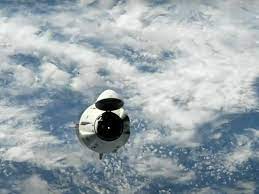
WASHINGTON, March 1, 2022 (BSS/AFP) - Three tycoons and an ex-NASA
astronaut are all set for the first fully private voyage to the International
Space Station next month -- just don't call them tourists.
That's the word from Michael Lopez-Alegria, formerly of the US space
agency and now commander of the Ax-1 mission, which will see the crew launch
from the Kennedy Space Center on March 30 aboard a SpaceX Dragon, then spend
eight days on the orbital platform.
The widely reported ticket price for the three business magnates is $55
million each, a figure that hasn't been disputed by Axiom Space, the company
managing the trip.
Speaking to reporters Monday, Lopez-Alegria said: "We are not space
tourists. I think there's an important role for space tourism, but it is not
what Axiom is about."
He added: "My crewmates have worked very hard....they're busy people and
they've taken a lot of time out of their lives to focus on this, and it's
definitely not a vacation for them."
The quartet are to carry out 26 experiments in microgravity, in areas
including heart and stem cell research, as well as a technology demonstration
for a self-assembling spacecraft.
The three paying crewmates are American real estate investor Larry Connor,
Canadian businessman Mark Pathy, and Israeli former fighter pilot and
entrepreneur Eytan Stibbe.
The mission comes in the midst of the Russian invasion of Ukraine. Most of
the crew's activities will take place in the US segment of the ISS -- Lopez-
Alegria said they "would like to go visit" the Russian section but would
require a safety escort as they're not trained in the Russian systems.
Spanish-American Lopez-Alegria flew to space four times for NASA before
retiring. He is now a vice president at Axiom.
The company has partnered for a total of four missions with SpaceX, and
NASA has already approved in principle the second, Ax-2.
Axiom sees the voyages as the first steps of a grander goal: to build its
own private space station. The first module is due to launch in September
2024, president and CEO Michael Suffredini said.
The plan is for it to initially be attached to the ISS, before eventually
flying autonomously when the latter retires and is deorbited sometime after
2030.
NASA wants to commercialize so-called Low Earth Orbit, leaving the private
sector to manage space stations for research and business purposes while it
focuses on exploration, such as trips to the Moon and Mars.
Last year, Russia also sent private crews to the ISS, though these
included active cosmonauts to fly the spacecraft. The first mission was to
shoot a film, while the second involved a Japanese billionaire and his
assistant.